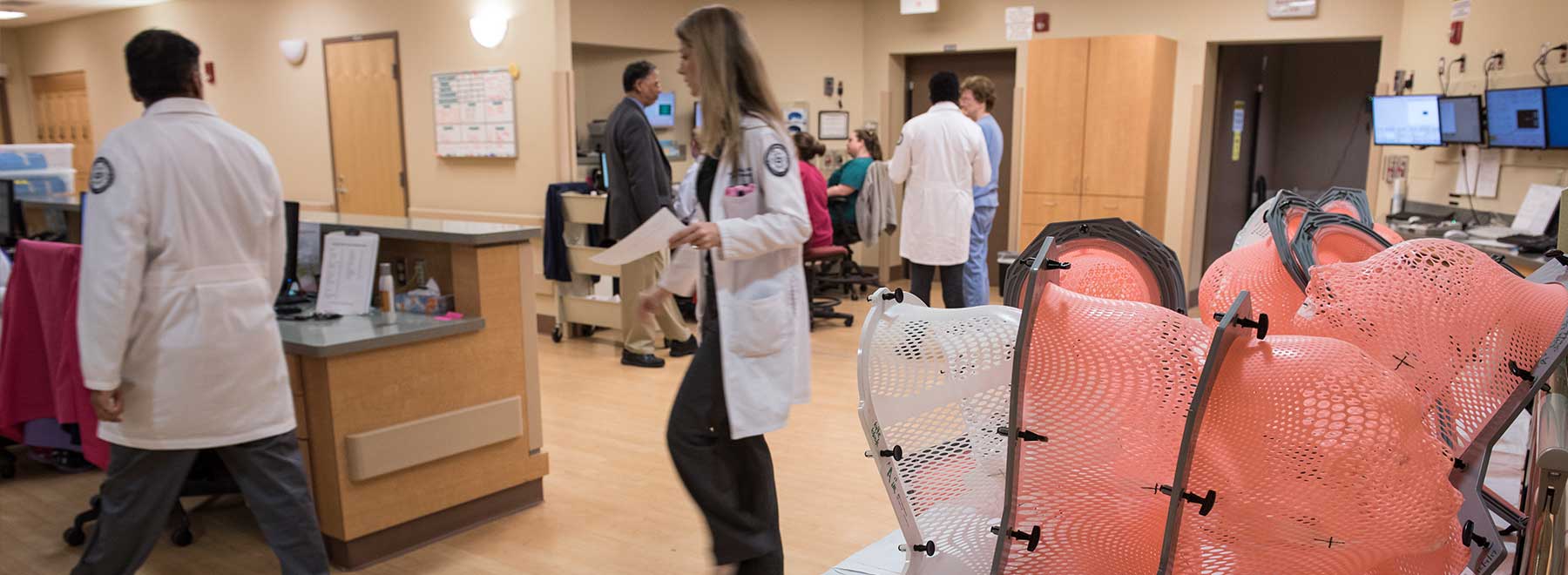Even in city’s water crisis, UMMC patients come first
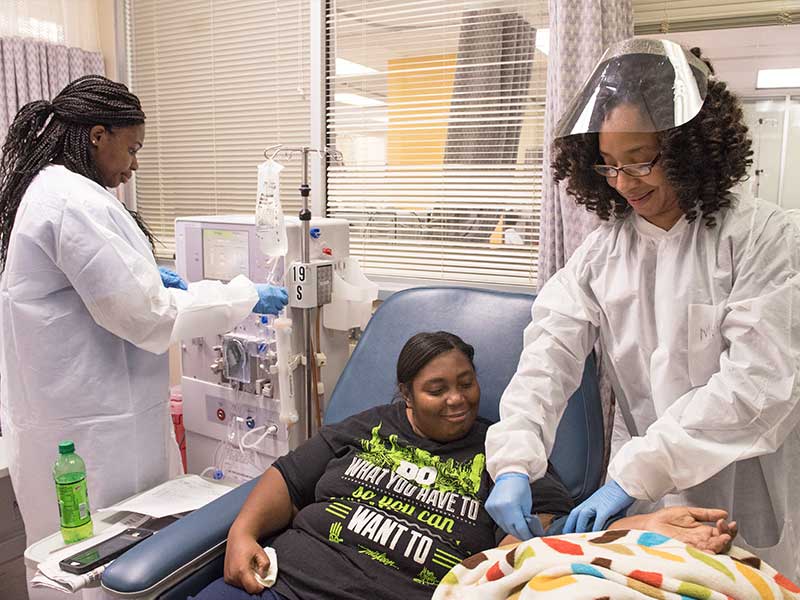
Alice Luckett had tickets to the New Orleans Saints’ playoff game Sunday against the Carolina Panthers, but she sold them so she could work all weekend.
In case you’re wondering: Yes, she has her priorities straight.
Luckett instead helped shepherd dozens of outpatients through their weekly dialysis treatments in the Adult Hospital’s Artificial Kidney Unit – expanded on Friday to grow from a 15-patient capacity to 38 as of Saturday.
Almost 150 kidney patients should be getting their four-plus hour dialysis treatments at the Jackson Medical Mall, but the University of Mississippi Medical Center was forced to shut its clinical operations there Thursday and relocate many services to the main campus or outlying clinics due to Jackson’s city-wide water crisis. The loss of water pressure rendered the Medical Mall’s heat pumps useless, and low pressure caused by burst pipes kept toilets from flushing and water from flowing.
UMMC’s main campus has its own water wells and tower and isn’t affected by the city’s water problems.
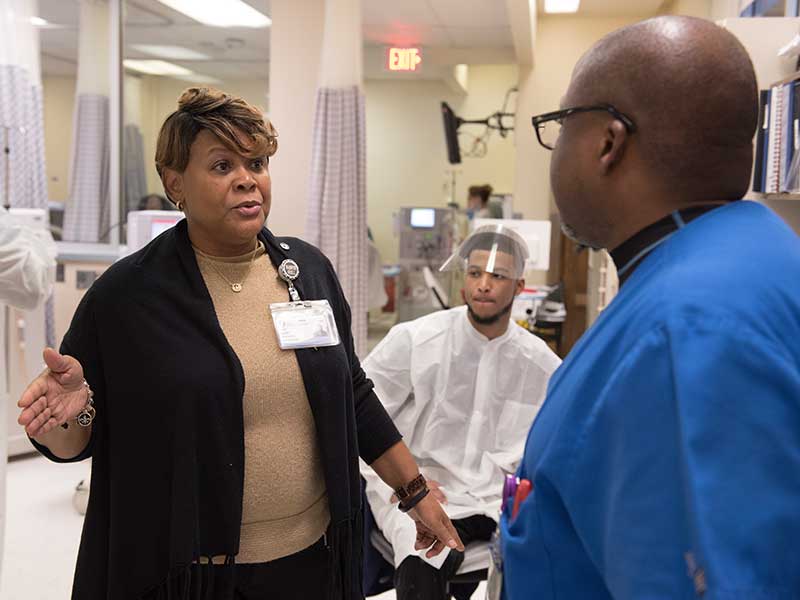
“I guess I was the interior decorator,” Luckett, clinical director of dialysis, joked Friday as UMMC Physical Facilities converted available space in the unit to six additional dialysis stations. Up to three patients instead of the usual one got their treatments in each permanent dialysis station, and a dozen or more waited their turn, but no one was complaining.
“There was no other option for these patients. No one else can accommodate this number,” said Ryan McMillan, director of adult nursing services. “We’ve gone to a 24-hour operation.”
The same creativity by necessity is ruling the day across campus as patients are being relocated and rescheduled in available space, and contingency plans have been finalized for up to another week of lost services at the Medical Mall.
At the radiation oncology department on the basement level of the main campus, staff today prepared to see 55 to 65 patients – 30 of them diverted from the Medical Mall. “We usually split that number in half between the two locations, but all of them are here today,” said Dr. Vijay Vijayakumar, professor and chair of the Department of Radiation Oncology.
About 20 radiation oncology employees have temporarily relocated to the main campus. The service on campus usually operates from 8 a.m.-5 p.m.; today, that’s 6:30 a.m.-6:30 p.m., or until every patient is seen.
Patients moved include Brookhaven resident Billy Jinks, who today received his 37th radiation treatment for prostate cancer. “It wasn’t a problem,” Jinks said of switching treatment locations. “As long as we get the treatment, everything’s fine.”
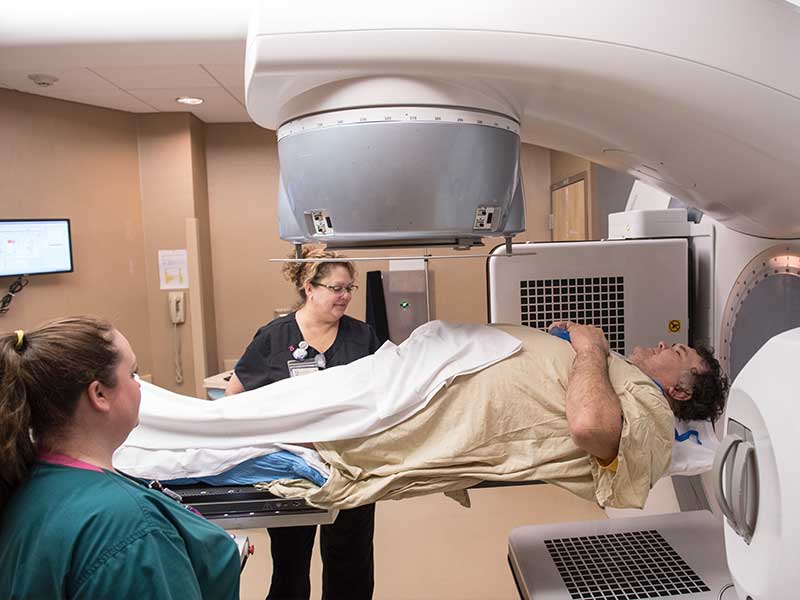
Among other clinics – and employees – temporarily moved, and patients being notified:
- The Cancer Institute’s infusion and chemotherapy services have been moved to the short-stay procedure area in the Adult Hospital. The Cancer Institute’s clinics also are sharing space at UP Belhaven.
- Adolescent medicine, general pediatrics, and complex pediatric services have been shuffled between campus and the Children’s of Mississippi north Jackson clinic.
- Psychiatry, pain management and hematology services have been moved to the Pavilion.
- High-risk OB-GYN patients are being seen at the Wiser Hospital for Women and Infants.
- Also, a portion of DIS staff has set up quarters in the Student Union conference room.
Even the new School of Medicine education building is in the mix. An area designed to teach medical students with simulated patients is being evaluated as a site for a temporary clinic space, if the need arises.
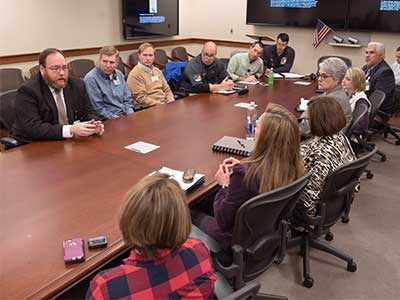
Employees not just at the Medical Mall, but campus wide “are doing an awesome job,” Dr. Jonathan Wilson, the Medical Center’s chief administrative officer, said as a team of administrators and department managers made quick work of reconfiguring clinical services affecting thousands of patients.
“Everybody from the providers and clinic staff to schedulers and facilities to the unit leaders and administrators are showing great teamwork,” Wilson said. “We’re putting our patients’ needs first to continue life-sustaining treatments and operations, even under extreme conditions.”
She had to drive an extra six or seven minutes to the main campus for thrice-weekly dialysis treatment, but Demetra Hamblin of Jackson was grateful for the care. “I got a call to tell me to come to the hospital instead today,” she said Friday.
High blood pressure has left her left kidney struggling to function. Usually, she watches television or naps during treatment at the Medical Mall, but even in the midst of much more noise and beeps than she’s used to, Hamblin cat-napped.
The close quarters weren’t all bad. “Today, I met him and we talked,” Hamblin said of a gentleman just a few feet from her chair. “I got a new friend today.”
UMMC last week delivered bottled water to Medical Mall employees and patients and brought a water tanker to the Mall parking lot to help ease the crisis. Patients and employees were still left shivering, a key factor into the decision to shut down most services and move or reschedule them.
As of Monday, other UMMC facilities in Jackson, such as clinic space at Select Specialty off Ridgewood Road, the Medical Tower on Woodrow Wilson, Lakeland Medical Building on Lakeland Drive, and gastroenterology services in the UP Belhaven building on North State Street, had enough water pressure and available toilets to remain open, and heating wasn’t affected.
Pharmacy services remained open at the Medical Mall, although a plan was worked out for medications requiring a temperature of at least 68 degrees, said Todd Dear, the Medical Center’s director of pharmacy.
The only use of the city’s water system on the main campus is for fire suppression. A somber concern is the possibility of a fire on the main campus if water pressure drops enough to thwart a good water supply. “Also, we’re being very cautious about electric heaters at the Medical Mall, because we will have no water if there’s a fire,” said Donnie Denton, senior safety officer.
The use of portable space heating devices is prohibited on the UMMC campus and at the Medical Mall in any patient settings, and can be used in areas of non-sleeping staff and employees only if they’re 500 watts or less. Almost all heaters are at least 1,000 to 1,500 watts, Denton said.
“The biggest risk is that if we lose pressure on campus, fire hydrants would be dry,“ Wilson said. “We’d have to bring in firefighting water from off campus, and we’ve coordinated a plan with Jackson, Madison, Flowood, Pearl and Clinton to shuttle in fire trucks and tankers of water and help us with firefighting and support.”
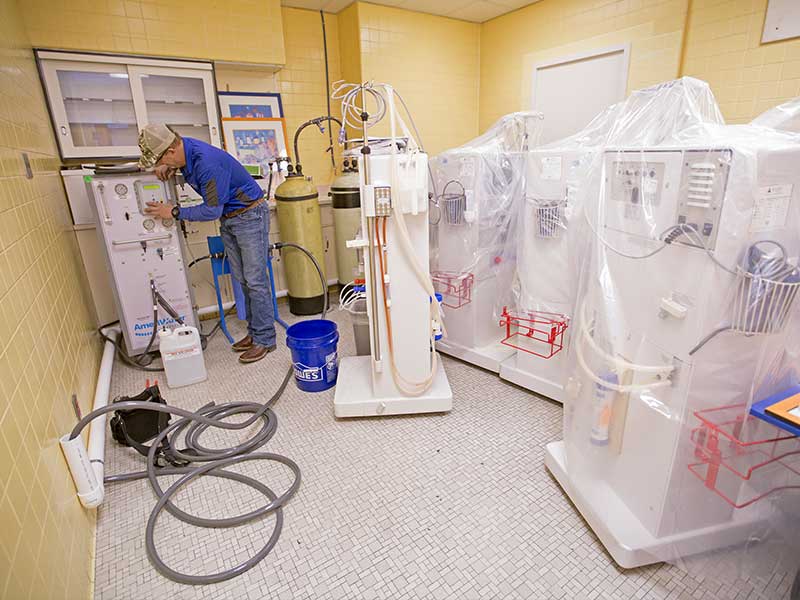
As conditions with the city’s water supply change, the Medical Center will adapt and adjust plans for staffing and patient care as needed, Wilson said.
“We’re very fortunate to have top-notch providers and employees that are flexible and willing to work in non-traditional areas for extra late hours, and working on their days off and in the cold,” Wilson said.
That includes Luckett and the host of employees, from dieticians to Volunteer Services to the many people who labored to carry in extra equipment and machinery to more than double the hospital’s dialysis unit capacity.
“All my plans are on hold. I’m a diehard Saints fan,” Luckett said. “I’m a season ticket holder. That’s my birthday present to myself every year.”
She dressed the part as she ushered in the weekend, though, sporting the colors of the cheerleading Saintsations.
“It’s always gold and black Friday,” she said. “Who Dat!”
UPDATE: As of about 1 p.m. Monday, enough water pressure and heat had been restored at the Jackson Medical Mall to begin moving back most clinic and other operations on Tuesday.



